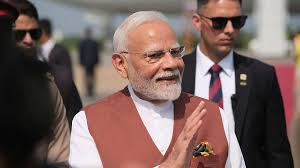Inking of India-UK trade pact, ties with Maldives focus of PM Modi’s visit this week

Prime Minister Narendra Modi will visit the United Kingdom and the Maldives from July 23 to 26, 2025. This two-nation trip aims to finalize a landmark India–UK Free Trade Agreement (FTA) and reset ties with the Maldives. The visit highlights India’s focus on strengthening global economic ties while maintaining influence in its neighbourhood.
India–UK Free Trade Agreement: A New Milestone
PM Modi’s stop in London (July 23–24) will conclude over three years of talks on the India–UK FTA. The agreement, finalized in principle in May 2025, will be formally signed during this trip.
The FTA is expected to boost trade between India and the UK, which currently stands at about USD 60 billion. With relaxed tariffs and improved market access, both countries aim to double this figure by 2030.
Major Benefits for India
India will see strong gains in sectors like:
- Textiles and garments
- Footwear and leather
- Pharmaceuticals
- Gems and jewellery
Under the agreement, around 99% of Indian exports will face zero duties in the UK. This move supports Indian MSMEs and encourages job growth across export-driven industries.
The FTA also includes a social security deal. Indian professionals working in the UK will now be exempt from paying National Insurance for up to three years. This provision offers major relief for IT and consulting firms, lowering business costs.
What the UK Stands to Gain
The UK will benefit from better access to India’s fast-growing market. Key sectors gaining entry include:
- Scotch whisky, with duties falling from 150% to 40% in phases
- Cars, with reduced tariffs under a quota-based system
- Medical and food products, such as chocolates, cheese, and salmon
The UK is also keen to expand cooperation in fintech, defence, clean energy, and higher education. These sectors match India’s long-term development goals.
Strategic Discussions on Broader Issues
PM Modi and UK Prime Minister Keir Starmer will also discuss the Comprehensive Strategic Partnership. Key areas include:
- Climate action and green technology
- Cybersecurity and artificial intelligence
- Student exchanges and skill development
- Indo-Pacific defence cooperation
PM Modi is also likely to meet King Charles III, adding symbolic importance to this visit.
Resetting Ties with the Maldives
After the UK visit, PM Modi will head to the Maldives (July 25–26). He will attend the nation’s 60th Independence Day as a special guest. This marks Modi’s first high-level visit since President Mohamed Muizzu took office.
Mending a Strained Relationship
President Muizzu began his term with strong anti-India rhetoric, demanding the removal of Indian troops. India respected that request earlier in 2025 but remained committed to deeper ties.
During the visit, the two leaders will review the India–Maldives Joint Vision for Economic and Maritime Security. The agreement, signed in 2024, covers cooperation in:
- Infrastructure and development projects
- Health and education
- Maritime security
- Tourism growth
India aims to reaffirm its support under the Neighbourhood First policy, ensuring development and stability in nearby nations.
Why the Maldives Matters
The Maldives holds a strategic position in the Indian Ocean. It plays a key role in regional shipping and maritime security. India’s visit aligns with its Vision MAHASAGAR, which promotes regional growth and peace in the Indo-Pacific.
China’s presence in the region is growing, especially through large-scale investments. India’s renewed outreach to the Maldives will help counter this influence and build long-term trust with its island neighbour.
Conclusion
PM Modi’s visit to the UK and the Maldives reflects India’s twofold foreign policy approach—expanding global trade partnerships and strengthening regional diplomacy. The India–UK FTA will offer new opportunities for trade and jobs. Meanwhile, the visit to the Maldives signals India’s intent to remain a trusted partner in South Asia.
These two visits, though distinct in nature, point to a shared vision: promoting economic growth, regional security, and global cooperation. The outcomes of this week will shape India’s global role and its ties with key partners for years to come.






